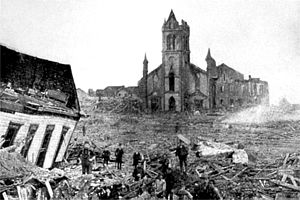| Damage from the 1900 Galveston hurricane, the deadliest natural disaster in U.S. history, was extensive. (Photo credit: Wikipedia) |
Facing natural disasters
Depending on where you live and your lifestyle it is almost a given that sooner or later you will be faced with a natural disaster. Some disasters, like earthquakes, mudslides and wildfires, happen quickly without warning. However, many natural disasters can be predicted and/or forecasted well in advance. These include hurricanes, tropical storms, typhoons, monsoons, tornadoes, tsunamis and blizzards. Obviously an advance warning of a natural disaster allows us to stock up on food and water, gas up the car(s), replace batteries, install the storm windows, batten down or remove any outdoor articles, prepare to evacuate and to evacuate. But what can we do to prepare ourselves and our family emotionally?
Hurricane Sandy
Yesterday Hurricane Sandy made landfall on the coast of New Jersey and now it is estimated that 60 million Americans are trying to cope with the aftermath. Think about that number. It is almost 20% of our population. So far 30 people lost their lives, 50 to 100 homes burned to the ground in Queens, NY, homes are flooded, trees are toppled, 15,000 airline flights have been cancelled today, businesses have been ground to a halt, millions are without power and a region is now facing the long, hard road to rebuilding. Many will question why they didn’t purchase flood insurance; some will regret not evacuating when the order was given; too many to count will wonder how they will make up their lost income; and still more will worry and wonder what effect this natural disaster will have on their children, because many parents know what it is like to live through a natural disaster and they, themselves, still experience anxieties, fears, stress and depression related to a past life event.
SAMHSA offers disaster distress resources
The Substance Abuse and Mental Health Services Administration (SAMHSA) offers a toll-free Disaster Distress Helpline 1-800-985-5990 or you can text TALKWITHUS to 66746. The deaf or hearing impaired can call 1-800-846-8517. It’s FREE and CONFIDENTIAL. This Disaster Distress Helpline operates 24/7, year-round offering crisis counseling and support. Here you can get a copy of their brochure and a card to carry in your wallet. SAMHSA lists these signs of distress which you may notice in a family member, friend or yourself:
- Sleeping too much or too little
- Stomachaches or headaches
- Anger, feeling edgy or lashing out at others
- Overwhelming sadness
- Worrying a lot of the time; feeling guilty but not sure why
- Feeling like you have to keep busy
- Lack of energy or always feeling tired
- Drinking alcohol, smoking or using tobacco more than usual; using illegal drugs
- Eating too much or too little
- Not connecting with others
- Feeling like you won’t ever be happy again
- Rejecting of help
Going forward…
The next few days will be critical. The next few weeks will seem to move slowly as those affected try to start the rebuilding process. But part of surviving a natural disaster depends on all of us pulling together; being available to our family and friends, offering support – emotional, financial or physical help. It is what we do best as a nation.
Today and going forward Cottonwood Tucson offers prayers for those impacted by Hurricane Sandy…
to accept the things I cannot change;
courage to change the things I can;
and wisdom to know the difference.









